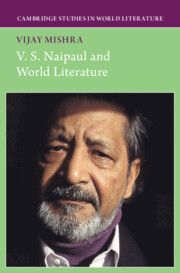Book contents
- V. S. Naipaul and World Literature
- Cambridge Studies in World Literature
- V. S. Naipaul and World Literature
- Copyright page
- Dedication
- Contents
- Figures
- Acknowledgments
- Prologue
- Introduction
- Chapter 1 V. S. Naipaul Aesthetic Ideology and World Literature
- Chapter 2 “The English Language Was Mine; The Tradition Was Not”
- Chapter 3 The Indenture Social Imaginary
- Chapter 4 Empires, Slaves, Rebels, and Revolutions
- Chapter 5 In the Shadow of the Master
- Chapter 6 The Travel Book and Wounded Civilizations
- Epilogue
- Notes
- Works Cited and Select Bibliography
- Index
Chapter 5 - In the Shadow of the Master
A Bend in the River
Published online by Cambridge University Press: 01 February 2024
- V. S. Naipaul and World Literature
- Cambridge Studies in World Literature
- V. S. Naipaul and World Literature
- Copyright page
- Dedication
- Contents
- Figures
- Acknowledgments
- Prologue
- Introduction
- Chapter 1 V. S. Naipaul Aesthetic Ideology and World Literature
- Chapter 2 “The English Language Was Mine; The Tradition Was Not”
- Chapter 3 The Indenture Social Imaginary
- Chapter 4 Empires, Slaves, Rebels, and Revolutions
- Chapter 5 In the Shadow of the Master
- Chapter 6 The Travel Book and Wounded Civilizations
- Epilogue
- Notes
- Works Cited and Select Bibliography
- Index
Summary
Chapter 5 marks Naipaul’s serious turn to Africa. In his first significant book on Africa, In a Free State (1971), Naipaul does not write the formulaic postcolonial novel; what he does is explore colonial repression, the silent, menacing, underside of the spirit of Victorian expansionism. And he does this in the shadow of the master, Conrad. To Naipaul, Conrad’s Africa is such a powerful foundational discourse that it shapes his reading of Africa, and especially of the Congo. But it also provides the right intertext for his own great work on Africa, A Bend in the River. The chapter argues that in the hands of Naipaul postcolonial reconstruction, decolonization, and the restructuring of class relations have a narrative function where an aesthetic impulse is always present. In that transformation human relations, and their representation, become important. For Naipaul, any new history – postcolonial or revisionist – remains equally “opaque” if in the absence of an open-ended critique it transforms social history into the dangerous, imperialist, great man narrative of history, precisely the kind of great man history celebrated under imperialism.
Keywords
- Type
- Chapter
- Information
- V. S. Naipaul and World Literature , pp. 131 - 163Publisher: Cambridge University PressPrint publication year: 2024

